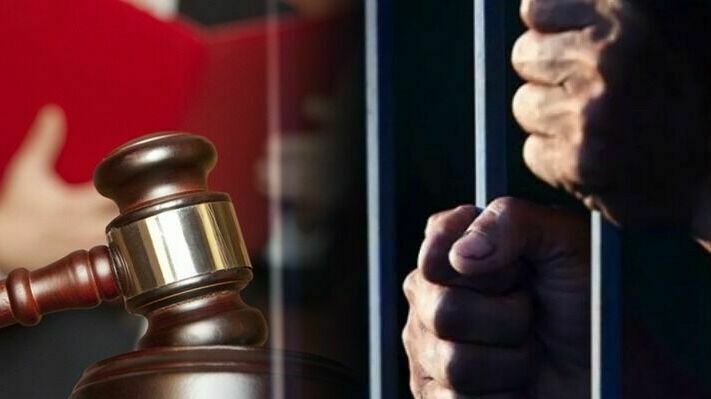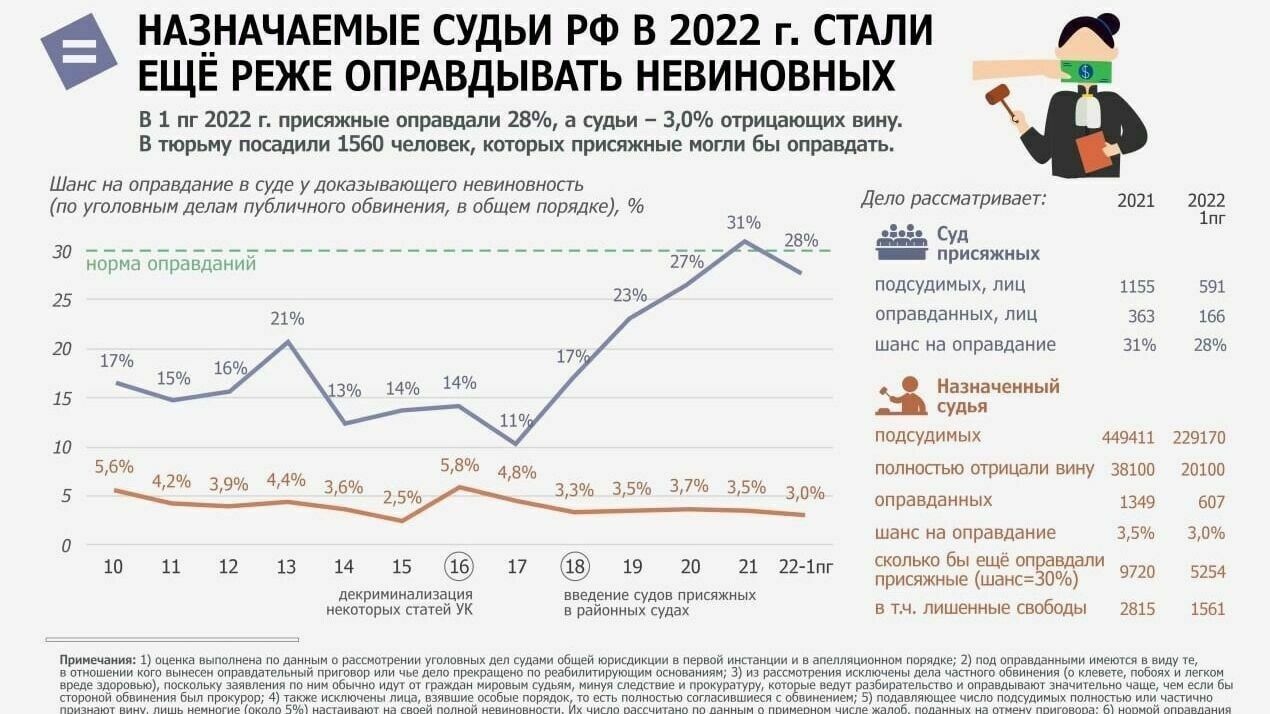Posted 30 декабря 2022, 08:21
Published 30 декабря 2022, 08:21
Modified 30 декабря 2022, 08:29
Updated 30 декабря 2022, 08:29

Results of the year: the chance of acquittal of the innocent in the courts of the Russian Federation has decreased to 3%!
Ivan ZubovIt's no secret that Russia is notorious all over the world, among other things, for its hideously low percentage of acquittals.
Much has already been said about this in the media and in the fiery speeches of various politicians and officials. However, the situation is not only not improving, but is getting worse even more, although, it would seem, there is nowhere further.
Experts of the channel "Equality. Media", having studied the data of judicial statistics, found out that the chance of acquittal in the courts of the Russian Federation for defending innocence decreased in 2022 from 3.5% to 3%, and this is one of the lowest values in the history of Russian themis. Here are just a few interesting details from this statistic:
Appointed judges of the Russian Federation have become even less likely to acquit the innocent. In the first half of 2022, they handed down 607 acquittals in cases of public prosecution. At the same time, cases against 229,170 persons were examined in a general manner, of which about 20,080 completely denied guilt, judging by the number of subjects complaining about the cancellation of the sentence. In other words, 3% of those proving their innocence had a chance of acquittal, estimated "Equality" according to the Judicial Department of the Armed Forces of the Russian Federation. This is one of the lowest values in the history of the Russian judicial system. In 2010, 5.6% of those who denied guilt had a chance of acquittal, and in 2021 – 3.5%. At the same time, jury trials in 1 pg 2022 acquitted 28% of the defendants, or 166 out of 591 people. In 2021 they found 31% of those who appeared before the court innocent. If we consider 30% as the norm of acquittal of those who deny guilt, it turns out that in 1 pg 2022, at least 5,254 people were convicted, whom the jury could have acquitted. Of these, more than 1,561 people were behind bars.
Why are appointed judges rarely acquitted
Professional judges consider the overwhelming number of criminal cases in Russia.
Usually they come from law enforcement agencies, prosecutors or court clerks. Judges are easily accessible for informal contacts with law enforcers and prosecutors and, by virtue of their career path, are "on the same wavelength" with them.
The key decision on the appointment of a judge to a position is made by the commission of the presidential administration for preliminary consideration of the appointment of judges and the termination of their powers. It includes representatives of law enforcement agencies who prepare characteristics for judges and, if signs of non-control are detected, they can screen out a candidate. In addition, an acquittal, even if it is passed, is often overturned by a higher court, which spoils the judge's career.
These and other features form the accusatory bias of justice. Appointed judges tend to pass guilty verdicts, often regardless of the evidence of guilt or justice. The judicial process is increasingly reduced to the assertion of the will of the security forces, although there are exceptions in the form of honest and courageous judges.
However, such problems are typical not only for the Russian Federation, but also for many states of bourgeois democracy. After all, judges are used there to a greater or lesser extent as an instrument of the domination of large capital. Only a few countries can boast that judges in them are elected by the people and they can be recalled by the voters, thanks to which they begin to serve the people to a greater extent, rather than monetary signs, superiors or people "with connections". Such a country was, for example, the USSR, where, with all the shortcomings in the selection of judges and the political bias that took place, the chances of an acquittal in ordinary proceedings were an order of magnitude higher than now.


How many innocent people are imprisoned in Russia
The assessment of the level of injustice in the courts of the Russian Federation was made according to the data of the Judicial Department at the Supreme Court of the Russian Federation on the consideration of criminal cases by courts of general jurisdiction (magistrates, district and regional) in the first instance (Form No. 1) and on appeal (form No. 6), as well as on the state of criminal record (form No. 10.1).
1. Defendants are those persons against whom a court decision has been rendered on the merits (convicted, acquitted, against whom the case has been terminated on rehabilitating and non–rehabilitating grounds, as well as against whom coercive measures have been taken).
In the first half of 2022, there were 384,263 of them.
2. Acquitted – those defendants against whom an acquittal has been passed or whose case has been terminated on rehabilitating grounds.
In 1 pg 2022 – 1400 people.
3. Private prosecution cases (on libel, beatings and minor harm to health) are excluded from consideration. Statements on them usually go from citizens to magistrates, bypassing the preliminary investigation and the prosecutor's office. Since the trial is conducted by judges between civil parties, they acquit much more often than if the prosecution were civil servants (601 out of 4669 defendants, or 13%).
Without them, the number of defendants is 379,594, and those acquitted are already 799 people.
4. Persons who have taken a special order, that is, who fully agree with the accusation, are also excluded. From 2020 OP became available only for minor and moderate severity cases.
Without them, the number of defendants – 229,761, acquitted – 773 people.
5. Data on jury trials are highlighted separately. They are often chosen by defendants who deny guilt. But they have jurisdiction over only a small number of particularly serious crimes (murder, grievous bodily harm, drug trafficking). Since June 2018, jury trials have been convened not only at the regional level (where the prosecution has learned to influence their selection and they justify in 15% of cases), but also at the district level, where the overwhelming number of cases are considered. There they are acquitted in 30-40% of cases, which demonstrates the quality of the prosecution in district courts.
In general, in 1 pg 2022, the jury examined the cases of 591 persons and acquitted 166 people (28%).
6. The overwhelming number of defendants fully or partially admit guilt, only a few insist on their complete innocence. The number of those proving innocence is calculated based on the data on the number of complaints filed for the cancellation of the verdict, based on the assumption that the person who disagrees with the prosecution will certainly appeal the court verdict.
They were served in the range from 11,826 to 27,123 units . (the average value is 19,474 units). Together with the acquitted, thus, the number of people proving their innocence will be 20,081, or 5.2% of all defendants.
7. The chance of acquittal is the ratio of the number of those acquitted to the number of those proving their innocence. In 1 pg 2022, when cases were considered by appointed judges in the general procedure and in cases of public prosecution, there were 607 of them out of 20,081 people, or 3%.
8. The standard of acquittal of those who prove their innocence, there are grounds to consider the level of acquittal by juries (30% on average for 2021-2022), who are much less interested in fulfilling the will of the prosecution than the appointed judges.
9. The level of injustice in the courts is how much the chances of acquittal of appointed judges are below the norm of excuses.
In 1 pg 2022, professional judges sentenced at least 5,254 people who could have been acquitted by a jury. Of these, 1,561 people were deprived of their liberty.
10. The surge of excuses by appointed judges in 2016-2017 was technical, because judges terminated cases on rehabilitating grounds under decriminalized articles.